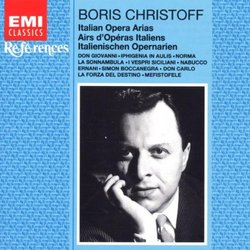| All Artists: Vincenzo Bellini, Arrigo Boito, Christoph Willibald Gluck, Wolfgang Amadeus Mozart, Giuseppe Verdi, Anatole Fistoulari, Herbert von Karajan, Issay Dobroven, Nicolai Malko, Vittorio Gui, Wilhelm Schuchter, Philharmonia Orchestra of London, Rome Opera Theater Orchestra Title: Boris Christoff: Italian Opera Arias Members Wishing: 0 Total Copies: 0 Label: EMI / Angel Records Release Date: 11/28/2000 Genre: Classical Styles: Opera & Classical Vocal, Historical Periods, Classical (c.1770-1830), Modern, 20th, & 21st Century, Romantic (c.1820-1910) Number of Discs: 1 SwapaCD Credits: 1 UPC: 724356550025 |
Search - Vincenzo Bellini, Arrigo Boito, Christoph Willibald Gluck :: Boris Christoff: Italian Opera Arias
 | Vincenzo Bellini, Arrigo Boito, Christoph Willibald Gluck Boris Christoff: Italian Opera Arias Genre: Classical
|
Larger Image |
CD Details |
CD ReviewsBoris Christoff is a great singing actor Peter Dietrich | Boston, MA United States | 11/25/2003 (5 out of 5 stars) "Boris Christoff is a great singing actorBoris Christoff (1914-1993) the greatest singing actor of the second half of the 20th century, the world famous Boris Godunov, great King Philip in Verdi's Don Carlo, noble Fiesco in Simon Boccanegra, marvelously vivid and powerful Mephistofeles in Gounod's Faust and great interpreter of many different roles in Russian, German (notably Wagner) and Italian repertoire performs on this CD arias form the Italian opera. In the critical discography of Atanas Bozhkoff biography Boris Christoff, published in 1991, critic Alan Blyth writs the following, "In spite of his familiarity with and understanding of the Russian repertory, Christoff from the beginning of his career determined to give equal time and attention to other repertory." In the first track on this CD we hear him in Mozart's disreputable Leporello, where he lightens and alters his tone, telling with delight and delicate nuance, the tale of Don Giovanni's conquests. It is a great characterization. Then we hear him in a complete contrast a baleful black-browned King Agamemnon in Gluck's Iphigenie in Aulide where his voice is powerful almost threatening but always very beautiful. Of great importance are the Verdi arias: Don Ruy Gomez De Silva's solo "Infelice! E tuo credevi," from the opera Ernani has seldom been sung with such fervor. Christoff adds the rousing cabaletta, at that time something of a rarity in performance of this opera. Both verses are dispatched with great verve. The interpretation of "O tu Palermo" from Vespri Siciliani matches the version on the live recording; the cries "A vittoria, all'onor" are sung beautifully and are full of the conviction and national fanaticism. The famous monologue from Don Carlo "Ella giammai m'amo" is the first of at least four studio recordings that would follow in later years. This one is conducted by Herbert von Karajan and it demonstrates Christoff's command of vocal color. He sings it with a tone that is private, soft, tender altering to the more expansive and sorrowful at "amor per me non ha." The King becomes solitary and withdrawn; his world becomes dark and lonely. In later recordings his performances became more refined and deeper. He became so famous in this role that his performances were unrivaled in opera houses for almost 40 years, as they remain unrivaled today on recordings. Christoff sung the role of King Philip all over the world, more than 420 times in various opera houses and his performances became classic. The next two tracks create contrasting moods where Christoff adopts a sardonic biting tone for the title role of Boito's opera Mefistofele. They exhibit his talents for pointed characterization. John B. Steane in his book "The Grand Tradition" (published by Charles Scribner's, Sons, New York, 1974), graphically describes Christoff's performances of these arias as marvelously sonorous, ringing and effortlessly sustained on the F-sharp, agile in its devilry without sacrificing the fine, resonant tone.
Lord Harewood in Opera on Record has stated that "Boris Christoff has a rare intensity and focus and re-hearing this set convinces me that his full fervent phrasing and ability to use the text bring him nearer than anyone else in their generation rivaling the operatic completeness of Maria Callas." The arias from Norma and La Sonannambula by Bellini and the Verdi arias from Nabucco, Simon Boccanegra and La Forza del Destino recorded in Rome in 1955 shows Christoff at his glorious best. They have never intoned with such power and authority as by Boris Christoff in this compilation nor has Padre Guardiano's aria from act II of La Forza del Destino been delivered with such pointed diction, such imposing tone as here. The arias from Norma and particularly from La Sonnambula call for suavity and legato singing. Here Christoff gives a singing lesson for every bass, displaying a richly honeyed sound. The great Fiesco aria from the Prologue of Simon Boccanegra shows Christoff at his dramatic best in which nobleman Jacobo Fiesco laments the death of his daughter Maria. These 5 star performances of great arias and scenes are the must have in every opera buff collection for they truly are the great recordings of the 20th century." |

 Track Listings (13) - Disc #1
Track Listings (13) - Disc #1